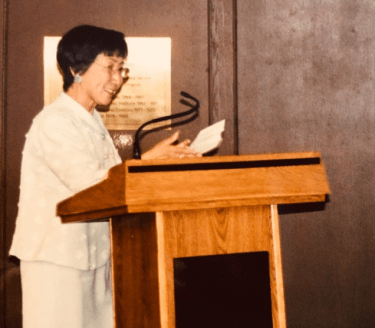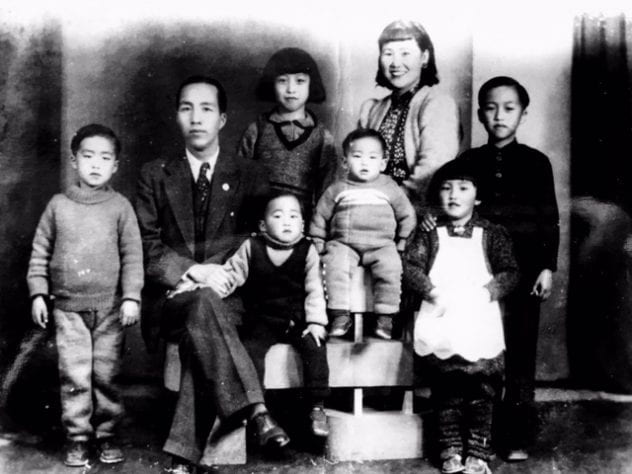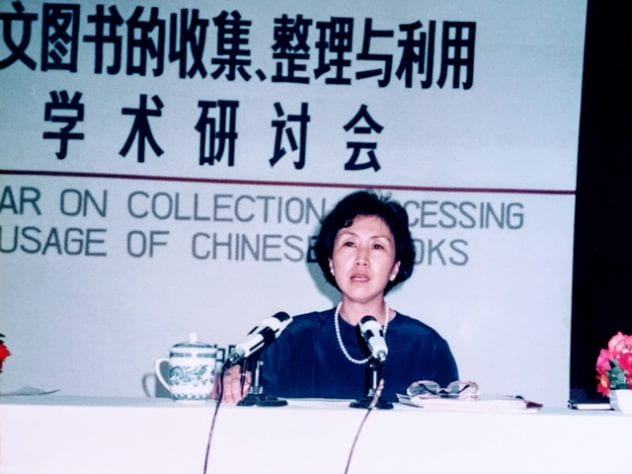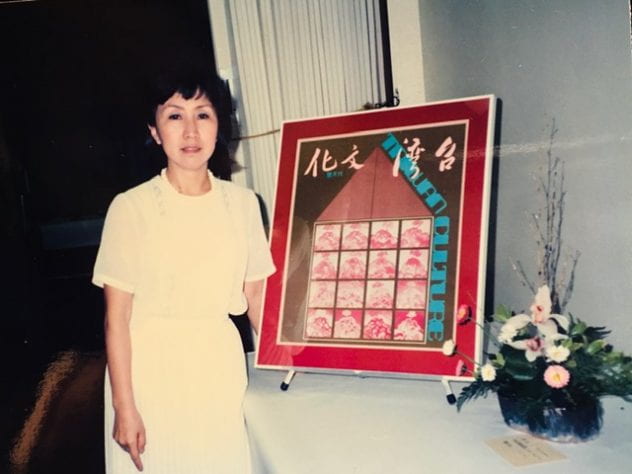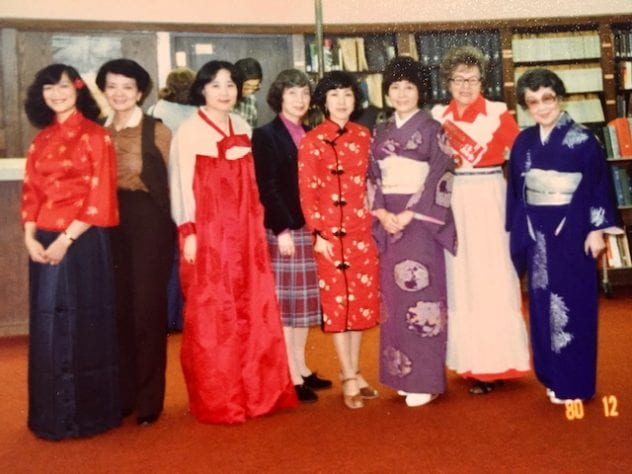May 13, 2021
Passion, Dedication, and Action: Yeen-Mei Wu and Tateuchi EAL’s Taiwan Studies Collection
Re-posted from the Tateuchi East Asia Library blog 5/5/21
In June 2001, a group of donors from the Taiwanese community in Seattle worked in a very short time to establish and provide basic funding for the Taiwan Collection Endowed Fund at the UW Libraries’ East Asia Library (today’s Tateuchi East Asia Library). Ms. Yeen-Mei Wu, then Chinese Studies Librarian at the East Asia Library, was the driving force behind this effort. This was the first endowment in an American library dedicated to collecting materials from or about Taiwan. In the same year, Yeen-Mei retired after a forty-year career in East Asian librarianship, working as Chinese studies librarian at UC Berkeley (1962-67) and UW (1969-2001).
Almost two decades later, in 2020, Yeen-Mei created yet another endowment to support Taiwan studies collections and activities: the Wu Yeen-Mei Taiwan Studies Endowed Fund at the Tateuchi East Asia Library 吳燕美華大東亞圖書館台灣研究基金. This marks the first time the UW has allowed vernacular script to feature an endowment name.
Yeen-Mei’s dedication and deep passion for building a strong Taiwan studies collection at the UW Libraries stem from her own roots in, and love for, Taiwan. Yeen-Mei’s father was a diplomat, beginning his career in the Ministry of Foreign Affairs of the Republic of China in Nanjing in 1931. Born in Taiwan in 1935, Yeen-Mei grew up in an extremely turbulent period in the history of Taiwan and China. She has five siblings: a sister and four brothers. As the family moved with her father’s diplomatic postings, by the age of eleven she had lived in many different countries. In her interview for Tateuchi EAL’s oral history project, Yeen-Mei commented that for Taiwanese during those times, life was full of bitterness and hardship. In 1946, following World War II, her family moved back to Taiwan, where her father settled as a businessman.
Yeen-Mei came to the US in 1959 to study business at the University of Michigan. She was part of the second wave of Chinese immigrants to the country, many of whom were from Taiwan. On her way to Ann Arbor, she stopped by San Francisco, and ended up staying. With the help of friends, Yeen-Mei enrolled in the School of Information at San Jose State College and worked at Stanford University Library in the summer. The next year, she enrolled in the School of Librarianship at UC Berkeley.
While studying for her Master of Library Science degree, Yeen-Mei worked part-time jobs in three libraries at UCB. One of these, the Center for Chinese Studies Library (CCS), offered her a librarian’s position before she even graduated. It was thus at CCS that Yeen-Mei began her career as a professional librarian in 1962. In 1967, Yeen-Mei moved with her husband and two young children to Seattle, where he worked for Boeing and Yeen-Mei was hired in 1969 as the Chinese Studies Librarian at UW’s Far Eastern Library, as it was then named. Yeen-Mei has lived in Seattle ever since, 54 years and counting. During this time, she has dedicated her professional life to developing an excellent Chinese studies collection, while building a Taiwan studies collection from scratch.
In the 1980s, most East Asian libraries in the United States moved their catalogs online. EALUW played a leading role in such moves towards library automation.
During her tenure at UW’s East Asia Library (EALUW), from October 1969 to August 2001, Yeen-Mei made many important contributions. In the 1980s, most East Asian libraries in the United States moved their catalogs online. EALUW played a leading role in such moves towards library automation. For example, it collaborated with Academia Sinica’s Computation Center in developing the Twenty-Five Dynastic Histories database, providing full-text searchable versions of key traditional Chinese histories. After the departure of EALUW director Karl Lo, Yeen-Mei took over and completed this important project, which had a significant impact on libraries and users worldwide.
As Chinese Studies Librarian, Yeen-Mei was responsible for collection development, user consultation, and reference. Following the normalization of diplomatic relations between the US and the People’s Republic of China in 1979, EALUW expanded its book acquisition network from Taiwan and Hong Kong to include mainland China. In 1989 Yeen-Mei visited Beijing for the first time, to present a paper at an international conference—held at Beijing Library, which later became the National Library of China—on Chinese library collections. That was only two months after the Tiananmen Incident.
Yeen-Mei Wu speaking at an international conference on Chinese collections, Beijing Library, August 1989Yeen-Mei Wu
At the beginning of 1987, Yeen-Mei spent three months as an exchange librarian at the National Central Library in Taiwan. Her hard work helped develop a collaborative relationship between UW Libraries and NCL. In the 1990s, when EALUW launched a rapid development of electronic resources, Yeen-Mei enthusiastically expanded her involvement in professional organizations and was elected chair of the Committee on Chinese Materials (1996-1999) of the Council on East Asia Libraries.
Yeen-Mei actively involved herself in local Taiwanese communities. In 1970, she was part of a group that founded the Taiwanese Association of Greater Seattle. In 1985 and 1986, she was elected chair of the Association. She brought in speakers for talks in local communities and on the UW campus, and introduced Taiwanese culture. One outstanding example was a joint exhibition of arts and crafts in June 1986.
Yeen-Mei’s election as Chair of the Taiwanese Association led to her blacklisting by the Kuomintang (KMT) government in Taiwan, but that did not stop her.
Yeen-Mei’s election as Chair of the Taiwanese Association led to her blacklisting by the Kuomintang (KMT) government in Taiwan, but that did not stop her. She joined the Greater Seattle Taiwanese Women’s Club when it was first formed in 1987 and served as its Chair from 2006 to 2008. She wrote a history of the club, compiled a video of its past activities, and was an active writer for its publication Funü yuandi 婦女園地 (Women’s Corner). In 1994, Yeen-Mei served as Head of the Taiwan Chorus. She led and performed at a series of successful events that brought significant visibility, including a Centennial of Washington State concert at the Seattle Center, the Festival of Music at Bellevue Square, and a performance in Portland. She was elected chair of the Taiwanese Culture Promotion Society (1985-90) in 1989. During her tenure, the organization hosted many lectures, including five on Taiwan studies.
Yeen-Mei is an excellent archivist, and carefully documents significant events. Items from her collections relating to Taiwanese organizations in Seattle were included in the digital project Historical Sources on the Taiwan Democratic Movement Overseas at Taiwan’s National Chengchi University (2013-14).
Recently she has been working hard to organize materials relating to the Taiwanese Association of Greater Seattle, which she plans to donate to Tateuchi EAL to establish an archive of local Chinese/Taiwanese-American history. She is also busy scanning her photo albums and adding captions.
Since I became Director of Tateuchi EAL in 2006, Yeen-Mei has been a strong supporter of my work. She introduced me to local Taiwanese communities and community leaders, and provided helpful advice to me in our community outreach programs. She generously shares information and documentation regarding our library. She has been actively involved in our library’s Oral History Project and served on its advisory committee. She herself has interviewed several community members, and donated time and money to the project.
Yeen-Mei has dedicated her new endowment fund to the collection of primary sources and scholarship relating to local Taiwanese history, focusing on Taiwan studies at the grassroots level. She especially encourages us to collect archival and other primary sources from the county level and below. She also promotes the collection of resources relating to Taiwanese communities in America, particularly in the greater Seattle area. As Bill Lavely, Chair of UW’s Taiwan Studies Program, has commented, “Building the TEAL collection of Taiwan local materials is a great project that will complement our program and help to build it into a research organization.”
“Building the TEAL collection of Taiwan local materials is a great project that will complement our program and help to build it into a research organization.”
Tateuchi EAL is blessed to have such wonderful retirees and friends as Yeen-Mei, who has dedicated her life-long work, love and professionalism to our library and its users through her exemplary actions.
Learn more about the Tateuchi East Asia Library
###
